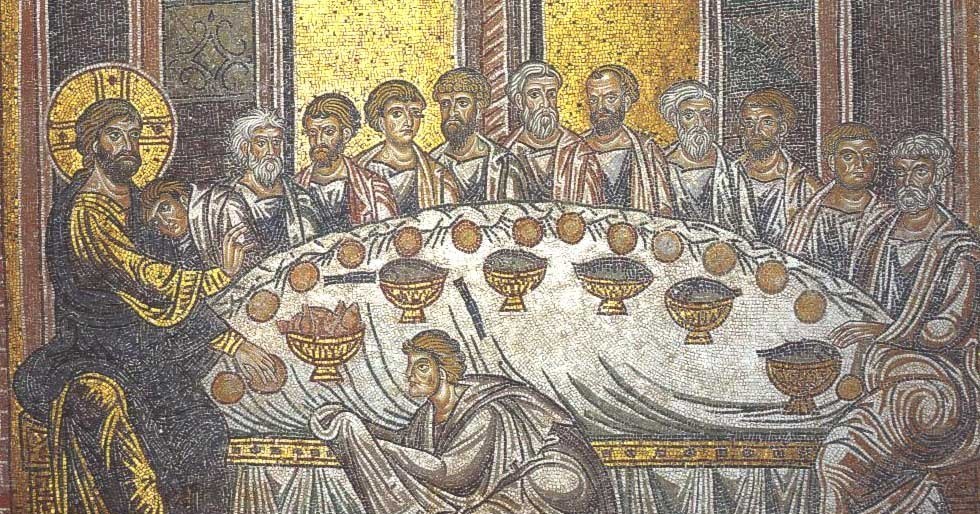Eucharist
National Liturgical Council

“Do this in memory of me”
Ever since Jesus bade his last supper companions to “Do this in remembrance of me,” his followers have gathered together, spoken faithfully of him, broken bread in his memory, and gone forth to live what they have prayed. We do this still. We celebrate Eucharist. It’s at the heart of our faith.
Eating and drinking with Jesus
Jesus’ disciples were familiar with his practice of inclusive dining. Table fellowship with him offered everyone a powerful experience of grace, mercy and fellowship. Never was this truer than on the night before he died. As recorded by Paul and all the gospel writers, though differently by John, Jesus gave himself to us as living bread and saving cup that night and told us to remember him this way.
Jesus’ words and gestures at that supper gave new form to his loving self-gift to the Father and to us. They summed up his life’s journey to the cross and on to glory, while summoning his followers to make his passover their own. Every Sunday Mass calls us to do just this.
The Eucharist: Breaking Bread with the Risen Lord
Many see in Luke’s beautiful Emmaus story (24:13-35) a portrait of the Eucharist. Just as Jesus accompanied the two disciples, unlocked the scriptures for them, broke bread with them and inspired them to mission, so we gather together, break open the Word of God, sup with the risen Lord, and go forth on mission.
The Eucharist is a rich and multi-faceted reality. It is thanksgiving to the Father, a memorial of Jesus Christ, and an invocation of the Holy Spirit. It makes us the Body of Christ and apostles of God’s reign.
Thanksgiving to the Father
From start to finish Jesus’ life and mission were intensely focussed on God his Father. His first words declared his duty to do the Father’s work (Lk 2:49). With his last he entrusted himself into the Father’s hands (Lk 23:46). Every Eucharist engages us in the Father-centred faith and prayer of Jesus. With him the Church acclaims God as Creator and Father and offers praise and thanksgiving for the gifts of creation and salvation.
Memorial of Jesus Christ
At the heart of the Eucharistic Prayer the mystery of faith is acclaimed by all. We confess Christ as crucified, risen and awaited. The whole mystery of his saving love is made present in the sign-action of the Eucharist. The consecrated bread and wine embody Christ’s presence uniquely, but in complementarity with his presence in the gathering of the faithful, the proclamation of God’s Word, and the person of the priest[i] (CSL #7).
The Eucharist is both meal and sacrifice. By eating and drinking with the Lord, the community of faith unites itself with the self-gift of Jesus to the Father and pledges its allegiance to the new and eternal covenant.
Invocation of the Holy Spirit
Today’s Eucharistic Prayers make explicit the role of the Holy Spirit in sanctifying the bread and wine and in making those who partake of these holy gifts “one body, one spirit, in Christ.” Our life in the Spirit, bestowed in baptism and sealed in confirmation, is nourished at the table of word and sacrament. And when we fail, the Eucharist’s repeated assurances of forgiveness make it a sacrament of mercy.
The Body of Christ – the Church
The early Church, as Luke presents it, was a community of faith, fellowship and prayer; Paul calls it the body of Christ (Ep 1:22-23). Its unity and diversity is manifest at the Eucharist. The whole assembly prays as one under the leadership of the priest celebrant, while faithful members of the assembly are called forth to exercise their baptismal mandate in a wide range of diverse ministries.
The reign of God
The Mass does not come to an empty conclusion. The dismissal pronounced by the priest celebrant is a commission, a directive for all who have taken part to live out what has been celebrated. All are sent forth as apostles of the reign of God.
The Eucharist does more. It opens onto an ultimate horizon beyond this world. It offers a vision of a new realm in which God will wipe away every tear from our eyes and death will be no more (Rev 21:4).
The last word: Sunday, the day of the Lord
Eucharist and Sunday go hand in hand. Sunday is the first day of the week, the day of the Lord, the day of resurrection and the new creation, the day of Eucharist and the Church.
Pope Francis concludes his apostolic letter on the Eucharist, Desiderio desideravi, with these words: “As the time made new by the mystery of His Death and Resurrection flows on, every eighth day the Church celebrates in the Lord’s Day the event of our salvation. . . From Sunday to Sunday, the word of the Risen Lord illuminates our existence, wanting to achieve in us the end for which it was sent (Cf. Is 55:10-11). From Sunday to Sunday, communion in the Body and Blood of Christ wants to make also of our lives a sacrifice pleasing to the Father, in the fraternal communion of sharing, of hospitality, of service. From Sunday to Sunday the energy of the Bread broken sustains us in announcing the Gospel in which the authenticity of our celebration shows itself”[ii].
[i] Constitution on the Sacred Liturgy, 7.
[ii] Desiderio desideravi, 65
Image Attribution - The Last Supper, Monreale Cathedral Mosaic, Photo: Sibeaster
